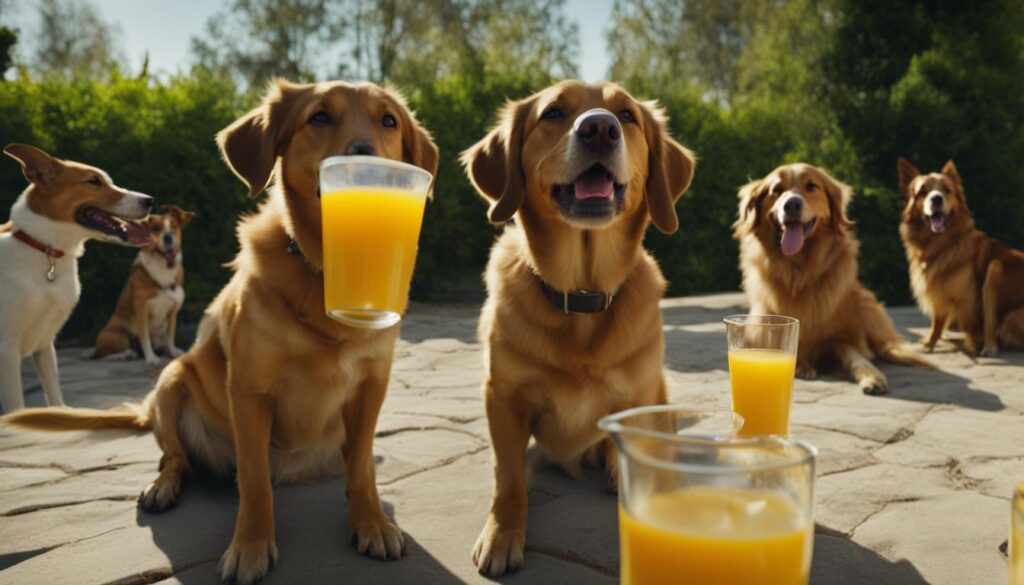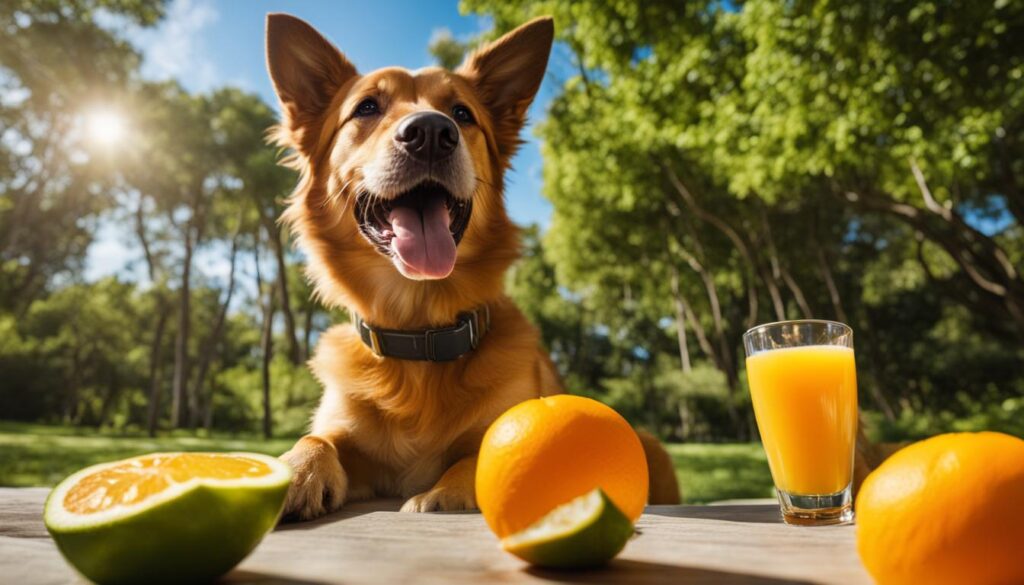As a pet owner, you may have wondered if it’s safe to give your furry friend a taste of your morning orange juice. While dogs may enjoy the flavor of orange juice, it’s important to understand the potential risks and benefits before sharing this beverage with your canine companion.
Can dogs drink orange juice? The answer is not as straightforward as you might think. While small amounts of orange juice may not be immediately harmful to dogs, it’s generally best to avoid giving it to them. Here’s why:
1. High Sugar and Fructose Content: Orange juice is naturally high in sugar and fructose, which can be detrimental to a dog’s health. Excessive sugar intake can lead to weight gain, dental problems, and gastrointestinal upset in dogs.
2. Natural Vitamin C Production: Unlike humans, dogs have the ability to naturally produce vitamin C in their bodies. As a result, they do not require additional supplementation from orange juice or other sources.
3. Healthier Alternatives: If you’re looking to provide your dog with a tasty and nutritious treat, there are safer alternatives to orange juice. Fresh fruits like melon, blueberries, apples, and bananas can offer health benefits without the risks associated with orange juice. Plus, they provide additional dietary fiber, vitamins, and minerals that can support your dog’s overall well-being.
Remember, when it comes to your dog’s diet, it’s crucial to prioritize their health and safety. While a small sip of orange juice may not cause immediate harm, it’s best to err on the side of caution and choose healthier options that align with your dog’s nutritional needs.
To learn more about the risks and benefits of giving orange juice to dogs, read on.
Key Takeaways:
- Orange juice is not recommended for dogs due to its high sugar and fructose content.
- Dogs naturally produce vitamin C and do not need additional supplementation from orange juice.
- Offering fresh fruits like melon, blueberries, apples, and bananas can provide safer alternatives for dogs.
- Prioritize your dog’s health and safety by opting for healthier options that align with their nutritional needs.
Signs of Dogs Liking Orange Juice

While dogs may show signs of enjoying the taste of orange juice, it’s important to understand that their preference does not necessarily indicate that it is safe or healthy for them to consume. Here are some common signs that dogs may exhibit if they like orange juice:
- Eagerly licking the juice
- Drooling
- Pawing at you
- Staring
- Wagging their tail
These behaviors may suggest that dogs find the taste of orange juice appealing. However, it’s crucial to recognize that their enjoyment of the flavor does not outweigh the potential risks associated with orange juice consumption in dogs.
The Science Behind Dogs and Orange Juice
Understanding the reasons behind a dog’s preference for orange juice involves considering their taste preferences and the potential impact of certain substances on their health. While dogs have taste receptors for sweet flavors, their digestive systems are different from ours, and they are unable to process certain components found in orange juice.
| Factors | Explanation |
|---|---|
| Sweet Taste Preference | Dogs have taste receptors for sweet flavors, which may explain why some dogs are attracted to the sweet taste of orange juice. |
| Avoidance of Bitterness | Oranges generally have a bitter aftertaste, which dogs may instinctively avoid. |
| Unsuitable Sugar Levels | Orange juice contains high levels of sugar and fructose, which can lead to weight gain, dental problems, and gastrointestinal upset in dogs. |
| Unnecessary Vitamin C | Dogs naturally produce their own vitamin C, and additional supplementation from orange juice is unnecessary. |
While dogs may exhibit signs of liking orange juice, it is important to prioritize their health and well-being. Providing dogs with appropriate and safe alternatives to orange juice is vital for their overall health.
History of Dogs and Orange Juice
Orange juice has a rich history that dates back to the 1920s when orange farmers in Florida faced a surplus of fruit. In an effort to preserve the oranges and make use of the excess, farmers began mass producing and pasteurizing orange juice, making it a readily available and popular beverage.
During this time, it is unlikely that dogs were intentionally fed orange juice. While dogs have been companions to humans for centuries, their diets traditionally consisted of the foods naturally available to them, such as meat and other sources of protein.
However, it is interesting to note that dogs have a long history of being scavengers and opportunistic eaters. They may have occasionally come across discarded orange peels or oranges, and it is possible that they may have ingested small amounts of juice in the process. However, this would have been a rare occurrence rather than a deliberate feeding.
It wasn’t until later years that the concept of orange juice as a beverage for dogs gained attention. As humans began consuming orange juice for its nutritional value, some pet owners wondered if their canine companions could benefit from it as well.
While history shows that dogs and orange juice have crossed paths, it is important to consider the potential risks and benefits before offering orange juice to your furry friend. We’ll explore these in more detail in the following sections.
Science Behind Dogs and Orange Juice

When it comes to the science behind dogs and orange juice, it’s important to understand the impact of this popular beverage on our canine companions. While orange juice is often praised for its high levels of vitamin C, it may not be as beneficial for dogs as it is for humans.
Dogs naturally produce their own vitamin C, so they do not require additional supplementation from orange juice. In fact, the levels of vitamin C in orange juice are negated by its high sugar and calorie content, which can potentially harm dogs.
Commercially produced orange juice can upset a dog’s stomach and cause digestive issues, especially if consumed in large quantities. Additionally, the high sugar content of orange juice can contribute to weight gain and dental problems in dogs.
While freshly-squeezed, raw orange juice in small amounts may be safer and offer some benefits, it is still crucial to consider other factors and prioritize hydration with the best choice for dogs: water.
The Effects of Orange Juice on Dogs
Consuming orange juice can have several effects on dogs, including:
- Upset stomach
- Digestive issues
- Weight gain
- Dental problems
| Effects of Orange Juice on Dogs | Benefits of Orange Juice for Dogs |
|---|---|
| 1. Upset stomach | – |
| 2. Digestive issues | – |
| 3. Weight gain | – |
| 4. Dental problems | – |
While the negative effects of orange juice on dogs are evident, it’s crucial to prioritize their health and well-being by choosing alternative sources of hydration and nutrition.
Training Dogs to Avoid Orange Juice
To prevent dogs from drinking orange juice, it is important to establish boundaries and provide alternative options. Here are some tips on how to train your dog to avoid orange juice:
- Do not intentionally give orange juice to your dog: Dogs may be curious and attracted to the smell and taste of orange juice, but it is essential to resist the temptation to offer it to them. This will help establish consistency and prevent any accidental ingestion.
- Keep glasses of orange juice out of their reach: Ensure that any glasses or containers of orange juice are placed in areas that are inaccessible to your dog. This includes countertops, tables, and other surfaces that they can easily reach.
- Offer healthier fruit alternatives: Instead of orange juice, provide your dog with other fruits that are safe for their consumption. Some suitable options include melon, blueberries, apples, and bananas. These fruits offer nutritional benefits and can be enjoyed by your dog without the risks associated with orange juice.
By following these training methods, you can effectively prevent your dog from drinking orange juice and ensure their safety and well-being.
The Health Benefits of Orange Juice

Orange juice is often touted for its health benefits in humans due to its high vitamin C content. However, when it comes to dogs, the situation is quite different. Dogs actually naturally produce vitamin C in their bodies, meaning they do not require additional supplementation from sources like orange juice.
While orange juice may seem like a refreshing and nutritious option for dogs, it is important to recognize that it is not necessary for their overall health and well-being. In fact, the high sugar content of orange juice can be detrimental to a dog’s health and lead to various issues, such as gastric upset, dental problems, and weight gain.
Instead of relying on orange juice as a source of hydration or nutrients, it is best to provide dogs with clean, fresh water. Water is essential for maintaining proper hydration and supporting the overall function of their bodies. Additionally, there are other safe and healthier alternatives for treating dogs, such as offering them fresh fruits like melon, blueberries, apples, and bananas. These fruits can provide dogs with beneficial nutrients without the potential risks associated with orange juice.
In conclusion, while orange juice may offer health benefits for humans, it is not necessary or beneficial for dogs. Dogs naturally produce vitamin C and do not require additional supplementation. Providing fresh water and other safe alternatives for treats and hydration is the best way to support a dog’s overall health and well-being.
Health Concerns of Giving Dogs Orange Juice

While dogs may find the taste of orange juice appealing, there are several health concerns associated with giving them this citrus beverage. It’s important to be aware of the risks involved to ensure the well-being of your furry friend.
Gastric Upset
Orange juice can cause gastric upset in dogs, leading to symptoms such as vomiting, diarrhea, and abdominal discomfort. The high acid content of orange juice can irritate their digestive system, resulting in these unpleasant gastrointestinal issues.
Dental Problems
The high sugar content in orange juice can contribute to dental problems in dogs. When dogs consume sugary substances like orange juice, it can lead to tooth decay, gum disease, and bad breath. It’s important to prioritize their dental health by avoiding sugary beverages.
Weight Gain
Orange juice is high in calories and sugar, which can contribute to weight gain in dogs. Excessive consumption of orange juice can lead to obesity, potentially causing a range of health issues such as joint problems, heart disease, and decreased life expectancy.
Increased Risk of Heart Problems
The high sugar content in orange juice can also increase the risk of heart problems in dogs. Studies have shown a link between high sugar intake and cardiovascular disease in both humans and animals. Therefore, it’s best to avoid giving your dog orange juice to maintain their heart health.
Considering these health concerns, it’s recommended to refrain from giving your dog orange juice as a beverage. Instead, opt for safer alternatives that provide hydration and nutritional benefits without the risks associated with orange juice.
When it comes to keeping your dog hydrated, providing fresh and clean water is the best option. Additionally, consider introducing other fruits that are safe for dogs, such as melon, blueberries, apples, and bananas. These fruits offer various health benefits while minimizing the potential risks that come with orange juice.
What to Do if Your Dog Has Had Orange Juice

If your dog accidentally drinks orange juice, it is important to take the necessary steps to ensure their well-being. While orange juice is not considered toxic to dogs, it can have adverse effects on their digestive system. Here’s what you should do if your dog has had orange juice:
- Monitor for symptoms: Keep a close eye on your dog for any signs of discomfort or illness. The most common side effects of orange juice consumption in dogs are vomiting and diarrhea.
- Provide water for rehydration: Ensure that your dog has access to fresh water to prevent dehydration. Orange juice can be acidic and may lead to increased thirst in dogs.
- Observe worsening symptoms: If your dog’s symptoms worsen or persist for an extended period, it is advisable to seek veterinary assistance. A veterinarian can provide guidance based on your dog’s specific condition.
Quote:
“While orange juice is not toxic to dogs, it can cause digestive upset. Monitoring your dog’s symptoms and providing water for rehydration is crucial. If the symptoms worsen, seeking veterinary help is recommended.” – Dr. Emily Thompson, Veterinarian
Remember, prevention is key when it comes to keeping your dog safe. To avoid any issues related to orange juice consumption, it is best to keep it out of your dog’s reach and provide them with a balanced diet that meets their nutritional needs. Water remains the most suitable fluid for dogs to stay properly hydrated.
| Symptoms | Actions |
|---|---|
| Vomiting and diarrhea | Monitor for worsening symptoms and provide water for rehydration |
In case of accidental consumption, knowing how to react and taking the appropriate steps can help ensure your dog’s well-being. Remember, it’s always best to consult with a veterinarian for personalized advice regarding your dog’s specific situation.
Alternatives to Orange Juice for Dogs

While orange juice may not be suitable for dogs, there are several healthy and tasty alternatives that you can offer your furry friend. These alternatives provide hydration and offer essential nutrients without the potential risks associated with orange juice.
1. Carrots
Carrots can be a delicious and nutritious alternative to orange juice for dogs. They are low in sugar and provide a crunchy texture that dogs enjoy. Carrots are also rich in vitamins and minerals, including vitamin A, which promotes healthy vision and a strong immune system. Simply wash and slice carrots into bite-sized pieces for your canine companion to enjoy as a sweet treat.
2. Pure Water
It’s important to provide your dog with access to clean, fresh water at all times. Water is essential for hydration and maintaining overall health. Make sure to change the water frequently and ensure that it is easily accessible for your dog.
3. Pedialyte (for mild dehydration)
In cases of mild dehydration, you can consider offering Pedialyte to replenish lost electrolytes. Pedialyte is a safe and effective electrolyte solution that is commonly used for children and can also be beneficial for dogs. However, it’s important to consult with your veterinarian before giving Pedialyte to your dog to ensure the appropriate dosage.
| Alternatives | Benefits |
|---|---|
| Carrots | – Low in sugar – Rich in vitamins and minerals |
| Pure Water | – Essential for hydration – Supports overall health |
| Pedialyte (for mild dehydration) | – Replenishes lost electrolytes – Safe and effective solution |
Remember, it’s always best to consult with your veterinarian before introducing any new foods or beverages into your dog’s diet. They can provide personalized advice based on your dog’s specific needs and health conditions. By choosing safe and healthy alternatives to orange juice, you can ensure that your dog stays happy and hydrated.
When Oranges Can Be Harmful for Dogs
Oranges are generally considered a healthy fruit for humans, but they can pose risks to dogs in certain situations. It’s important to understand when feeding oranges to dogs can be harmful and the potential risks involved.
First and foremost, dogs with diabetes should avoid oranges. Oranges contain a high amount of sugar, which can cause a rapid increase in blood sugar levels. This can be dangerous for dogs with diabetes and may lead to complications and imbalances in their insulin levels.
Additionally, dogs that are overweight or have weight management issues should steer clear of oranges. The high sugar content in oranges can contribute to weight gain and potentially worsen existing weight problems in dogs.
Furthermore, dogs with sensitive digestion may experience gastric upset when consuming oranges. The acidic nature of oranges can irritate the stomach lining and lead to digestive issues such as diarrhea, vomiting, and discomfort.
It’s important to note that while oranges can be harmful in these specific cases, they are generally not toxic to dogs in moderate amounts. However, it is always best to consult with a veterinarian before introducing any new foods to your dog’s diet.
When it comes to feeding fruits to dogs, it’s important to consider alternative options that are safe and beneficial for their health. There are plenty of other fruits that dogs can enjoy without the potential risks associated with oranges.
- Apples: Apples are a great source of vitamins and fiber for dogs. They can be given in small slices, ensuring the removal of seeds and core.
- Watermelon: Watermelon is hydrating and low in calories, making it a refreshing treat for dogs on hot summer days. Remove the seeds and rind before offering it to your furry friend.
- Blueberries: Packed with antioxidants, blueberries are a nutritious snack for dogs. They can be served fresh or frozen for a cool summer treat.
- Bananas: Bananas are a good source of potassium and fiber for dogs. Mash or slice them into small pieces for easy consumption.
By understanding the potential risks of feeding oranges to dogs and exploring safer alternatives, you can ensure the well-being and health of your four-legged companion.
Can Dogs Have Orange Peels or Seeds?
When it comes to feeding dogs oranges, it’s important to remove both the peels and seeds before offering them as a treat. Orange peels are difficult for dogs to digest and can pose a choking hazard. Additionally, orange seeds can be problematic and may cause digestive issues if ingested. To ensure the safety of your furry friend, always remove the peels and seeds before sharing any orange treats with them.
If you’re unsure about feeding your dog oranges or any other human food, it’s best to consult with your veterinarian. They can provide professional advice tailored to your dog’s specific needs and help you make informed decisions about their diet.
Remember, while oranges can be a healthy and refreshing snack for humans, they may not necessarily have the same benefits for our canine companions. It’s always crucial to prioritize your dog’s health and well-being by offering them safe and appropriate food options.
| Can Dogs Have Orange Peels? | Can Dogs Eat Orange Seeds? | Risks of Orange Peels and Seeds for Dogs |
|---|---|---|
| Orange peels are difficult to digest and can pose a choking hazard for dogs. | Orange seeds can cause digestive issues if ingested by dogs. | The risks include choking, digestive problems, and potential blockages in the gastrointestinal tract. |
Wrapping Up
After carefully considering the effects of orange juice on dogs, it is evident that it is not a suitable beverage for their consumption. The high sugar and acid content of orange juice can lead to gastric upset, dental issues, weight gain, and an increased risk of heart problems. While dogs may enjoy the taste, it is important to prioritize their health and well-being.
Additionally, dogs do not require the extra vitamin C found in orange juice, as they naturally produce it. Instead, providing them with fresh fruits like melon, blueberries, apples, and bananas can offer a healthier alternative without the associated risks.
To ensure optimal hydration for dogs, water is always the best choice. It is a safe and essential fluid that can keep them hydrated without any negative side effects. By avoiding orange juice and opting for safer alternatives, you can prioritize your dog’s health and help them live a long and happy life.
FAQ
Can dogs drink orange juice?
No, orange juice is not recommended for dogs due to its high sugar and fructose content. It can cause gastric upset, dental problems, and weight gain. Dogs do not need the extra vitamin C found in orange juice as they naturally produce it.
Are there any benefits of orange juice for dogs?
Dogs do not require orange juice for any specific health benefits. Fresh fruits like melon, blueberries, apples, and bananas can provide health benefits without the risks associated with orange juice.
Can dogs have orange juice in moderation?
While small amounts of freshly-squeezed, raw orange juice may be safer and more beneficial than commercially produced orange juice, it is still not recommended. Water is the best choice for hydration for dogs.
Why do dogs like orange juice?
Dogs may enjoy the taste of orange juice and show signs such as eagerly licking the juice, drooling, pawing at you, staring, and wagging their tail. However, just because a dog likes the taste of something doesn’t mean it is safe or healthy for them to consume.
Can dogs have other fruit juices instead of orange juice?
It is generally advised to avoid giving dogs fruit juice, including orange juice. Water is the best source of hydration for dogs, and fresh fruits like melon, blueberries, apples, and bananas can be given as treats in moderation.
How can I prevent my dog from drinking orange juice?
To prevent dogs from drinking orange juice, do not intentionally give it to them, and keep glasses of orange juice out of their reach. Offering other fruits as treats can be a healthier and safer alternative.
What are the health concerns of giving dogs orange juice?
Orange juice can cause gastric upset, dental problems, weight gain, and an increased risk of heart problems in dogs due to its high sugar and acid content. It is not recommended for their consumption.
What should I do if my dog has accidentally consumed orange juice?
Orange juice is not considered toxic to dogs, but it can cause vomiting and diarrhea. Monitor your dog for worsening symptoms and ensure they have access to water for rehydration. Seek veterinary help if symptoms persist.
What are the alternatives to orange juice for dogs?
Water is the best choice for hydration for dogs. Additionally, fresh fruits like melon, blueberries, apples, and bananas can provide health benefits without the risks associated with orange juice.
Are oranges harmful to dogs?
Oranges can be harmful to dogs with diabetes, dogs that are overweight, and dogs with sensitive digestion. The high sugar and acid content in oranges can worsen existing health problems and cause gastric upset.
Can dogs have orange peels or seeds?
Orange peels and seeds are difficult to digest and can pose a choking hazard for dogs. It is important to remove both the peel and seeds before offering an orange treat to a dog.






